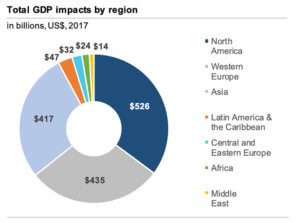
The Events Industry Council’s “Global Economic Significance of Business Events” study found that Asia was the largest region in terms of business event participants, representing nearly one-third of 1.5 billion total participants worldwide.
Business events helped pump $1.5 trillion into the world economy last year, according to final results of the Events Industry Council’s (EIC) “Global Economic Significance of Business Events” study.
The study is the first research on the economic significance of face-to-face business events worldwide. And the figures, released Monday, build on preliminary results announced last month at IMEX America 2018 in Las Vegas.
According to the report, business events generated $621.4 billion (U.S.) of direct gross domestic product (GDP) and contributed a total global GDP impact of $1.5 trillion.
Additionally, the study found that business events directly generate more than 10.3 million jobs worldwide, with a total effect of 25.9 million jobs.
“For the first time our industry is able to prove just how formidable an economic engine business events are globally,” said Cathy Breden, CMP, CAE, chair of the EIC Research Committee. “This study enables everyone involved in bringing people together for meaningful face-to-face interactions to show their true value and substantial contributions to growth and opportunity.”

Source: “Global Economic Significance of Business Events”
The report also found that Asia was the largest region in terms of business event participants, representing nearly one-third of 1.5 billion total participants worldwide. Western Europe ranked second with almost 30 percent, followed by North America with nearly 22 percent of all attendees.
The trillion-dollar plus (U.S.) outlay reflects the spending attributed to planning, producing, attending, and/or hosting business events, which are defined as “a gathering of 10 or more participants for a minimum of four hours in a contracted venue,” and include meetings, conferences, conventions, exhibitions, and incentive travel. Not counted in this study are social, academic, recreational activities, or consumer expositions.
More than 15 countries representing a diverse group of regions, national GDPs, domestic and international travel behaviors, in conjunction with third-party data were used for an in-depth analysis of spend, arrivals, market size, and activity.
EIC commissioned the study and research was conducted by Oxford Economics as part of a collaboration between EIC and its partners:the PCMA Education Foundation, IMEX, Hilton, and the MPI Foundation.
“The ‘Global Economic Significance of Business Events’ is a vital tool for our industry to help both private and public sectors everywhere better understand how important business events are (in) developing and sustaining thriving local, regional, and national economies,” said EIC CEO Karen Kotowski, CMP, CAE. “We are grateful that leading organizations, Hilton, IMEX, MPI Foundation, and PCMA Education Foundation worked together to partner with EIC to support this monumental research.”
